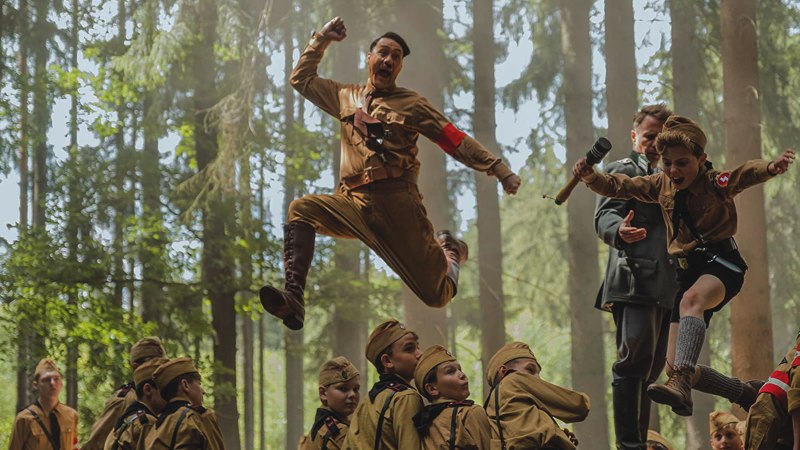Poking fun at the Nazis is nothing new. On the other hand, choosing a zealous member of their order as an empathetic protagonist – complete with a caricatured version of Hitler himself as the character’s best friend – perhaps is. Wringing both compassion and comedy out of that premise is a tall order, but if there’s one man who can manage to successfully whip away the tablecloth from such a bonkers feast, it’s Kiwi auteur Taika Waititi. And manage it he does, albeit with a few broken glasses along the way.
Waititi’s first masterstroke is to filter the story through the eyes of the eponymous Jojo (Roman Griffin Davis), a 10-year-old member of the Hitler Youth who fervently believes all the propaganda against the Jewish race that he has been fed. An innocence on the verge of corruption is the perfect conduit for Waititi’s scorn and ridicule of Nazi ideals, while his second touch of genius is – as he did to great effect in Thor: Ragnarok and What We Do in the Shadows – insert himself into the story, as Jojo’s make-believe confidante Adolf.
When we first meet Jojo, he’s gearing himself up for his first day at the Nazi Youth boot camp, where he will meet the drink-addled Captain Klenzendorf (Sam Rockwell) and his two stooges, Fraulein Rahm (Rebel Wilson) and Finkel (Alfie Allen). The pair represent Waititi’s first missteps, serving as nothing more than paper-thin vehicles for Nazi-bashing via silly German accents and slapstick posturing. Klenzendorf’s character fares little better, despite the development of an arc that feels slightly undeserved, but Rockwell’s superior acting and excellent comedic chops pull him out of a nose dive.
The same is true for Waititi himself. His Adolf springs up at periodic intervals to offer goofy anachronisms and dole out big brother-style advice to Jojo, before later developing into a foot-stomping spoilt child when things don’t go his way. That much of the laughs derive from Waititi’s campy German brogue and out-of-place contact lenses is a testament to the paucity of genuine wit on offer, but the low-hanging fruit is gobbled up and the cheap laughs garnered effectively all the same due to Waititi’s impeccable clowning abilities.
So far, so puerile. But things will take a turn for the more complicated when Jojo stumbles across Elsa (Thomasin McKenzie), a Jewish girl he discovers his mother Rosie (Scarlett Johansson) has been secreting in a crawlspace in his missing sister’s old room. The entrance of the two females brings genuine pathos to a story which had until now been characterised by inconsequential shenanigans and unsubstantial mockery. Both actresses are phenomenal in their roles, Johansson bringing a whimsical charm and quiet defiance to Rosie and McKenzie stealing the show with a smouldering dignity that lights up every scene she’s in. If the boys are here for laughs alone, the girls inject a mite of much-needed emotion into what could have become a controversially flippant take on the Holocaust.
Seizing upon these two key threads, Waititi ties up his narrative in a neat little bow in the second half of the film, compensating for the tonal inconsistency and cheap comedy which had compromised the first. The end result is a movie which humanises Nazi Germany whilst simultaneously unmasking the lunacy of its doctrine, which would undoubtedly be laughable if it wasn’t so god-damned dangerous and evil. Fortunately, Waititi’s expert hand allows us to eat our cake and still have it, guffawing periodically throughout, but in no doubt whatsoever at the final curtain that wartime is no laughing matter.
